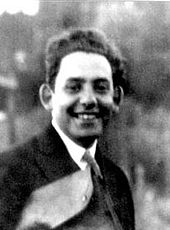Leo Smit (composer, 1900)
Leo Smit (born May 14, 1900 in Amsterdam ; died April 30, 1943 in the Sobibor extermination camp ) was a Dutch composer and pianist .
Life
Leo Smit came from a wealthy family of Portuguese-Jewish origin. He received music lessons at an early age and studied piano and composition at the Amsterdam Conservatory from 1919 to 1924 ; Sem Dresden and Bernard Zweers were among his teachers . The orchestral work “Silhouetten”, composed in 1922, premiered three years later with the Concertgebouw Orchestra under the direction of Cornelis Dopper . Drafted into military service, Smit was declared unfit for a while and worked as a lecturer in harmony and music education at the Amsterdam Conservatory.
In 1927 he moved to Paris , where he stayed for nine years and took up musical influences from composers such as Maurice Ravel , Igor Stravinsky , Darius Milhaud , Arthur Honegger and Francis Poulenc , but continued to maintain close contacts in Holland. In 1933 he married Engeline de Vries, who followed him to Paris. After a year in Brussels , Smit returned to Amsterdam in 1937, where he gave private lessons in piano, music theory and composition. Smit's compositions were regularly heard on Dutch radio.
With the German invasion of the Netherlands in World War II , Smit's situation deteriorated and his music could no longer be performed. Nevertheless, he continued to compose, his last work being a sonata for flute and piano, completed in February 1943. In April 1943, Leo Smit and his wife were deported via the Westerbork transit camp to the Sobibor extermination camp , where both were murdered.
Smit composed orchestral works and chamber music based on Claude Debussy and Albert Roussel . After his death he was completely forgotten at first, but his works have been performed more frequently again since the late 1980s.
Works
- Overture to Herman Teirlinck's De vertraagde film for orchestra (1923)
- Silhouettes for orchestra (1925)
- Suite for piano (1926); Forlane et Rondeau, freely arranged for orchestra by Godfried Devreese (1958)
- Trio for flute , viola and harp (1926)
- Quintet for flute, violin , viola, cello and harp (1928)
- Deux hommages to Sherlock Holmes and Philo Remington , the inventors of the typewriter; for piano (1928–1930)
- Schemselnihar , ballet for orchestra (1929)
- Concertino for harp and orchestra (1933)
- Sextet for flute, oboe , clarinet , bassoon , horn and piano (1933)
- Symphony in C major (1936)
- Concerto for piano and wind orchestra (1937)
- Concertino for cello and orchestra (1937)
- Suite for oboe and cello (1938)
- Trio for clarinet, viola and piano (1938)
- Little Prelude van Ravel , for alto and piano; Text by Martinus Nijhoff (1938)
- La Mort , for soprano , alto and piano, text by Charles Baudelaire (1938)
- De bruid , for female choir, text by Jan Prins (1939)
- String Quartet (1939-1940)
- Divertimento for piano four hands (1940); for orchestra arranged by Andries van Rossem (2008)
- Concerto for viola and string orchestra (1940)
- Sonata for flute and piano (February 12, 1943); for orchestra arranged by Willem Strietman (1989)
- Twaalf stukken voor 4 handen for piano four hands
See also
literature
- Klaus Bertisch: Leo Smit. Unheard of talent . Published by the Centrum Judaicum . Hentrich & Hentrich, Berlin 2014, ISBN 978-3-95565-070-4 (= Jewish miniatures. Volume 156).
- Jurjen Vis: Silhouettes: de componist Leo Smit 1900–1943. Donemus, Amsterdam 2001, ISBN 90-74560-43-1 .
- Huib Ramaer: Smit, Leo (i). In: Grove Music Online (English; subscription required).
Web links
- Biography of Eleanor Pameijer (Engl.)
- Leo Smit Foundation (English, Dutch)
- Leo Smit (1900–1943) at joodsecomponisten.nl (Dutch)
- Leopold Smit at joodsmonument.nl (English, Dutch)
| personal data | |
|---|---|
| SURNAME | Smit, Leo |
| BRIEF DESCRIPTION | Dutch composer and pianist |
| DATE OF BIRTH | May 14, 1900 |
| PLACE OF BIRTH | Amsterdam |
| DATE OF DEATH | April 30, 1943 |
| Place of death | Sobibor extermination camp |
